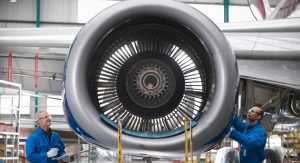Aeronautical engineering is one of the most exciting, innovative, and technically demanding fields in the engineering profession. Aeronautical engineers are responsible for the design, development, testing, and production of aircraft and related systems.
Their work contributes not only to the safety and efficiency of air travel but also to the advancement of aerospace technology, including drones, unmanned aircraft, and spacecraft.
With the global focus shifting towards more sustainable aviation solutions, such as electric aircraft and alternative propulsion systems, the demand for aeronautical engineers continues to grow.
However, with this increased demand, many aspiring engineers are curious about the salary prospects in this field. In this article salary for aeronautical engineering, we will delve deep into the salary ranges for aeronautical engineers in the UK, factors affecting their earnings, and the career progression that can lead to higher pay.
What Is the Average Aerospace Engineering Salary in the UK?

The average salary for an aerospace engineer in the UK is competitive with other technical fields, making it an attractive career option for those with a passion for aviation and engineering.
Based on recent data, the average salary for an aerospace engineer in the UK ranges from £35,000 to £50,000 per year. This salary range is typical for engineers who have gained some experience and have moved beyond entry-level positions.
Why Salary Ranges Vary?
The salary for an aerospace engineer can vary significantly depending on several factors, including location, company size, and industry demand.
For example, London, as a major financial and industrial hub, tends to offer higher salaries compared to smaller cities due to its higher cost of living and the concentration of major aerospace companies.
In contrast, regional hubs such as Derby and Bristol, while offering slightly lower salaries, provide engineers with more affordable living conditions and excellent career opportunities due to the presence of major aerospace companies like Rolls-Royce and Airbus.
| Experience Level | Average Salary per Year |
| Entry-Level | £25,000 – £30,000 |
| Mid-Level | £35,000 – £50,000 |
| Senior Engineer | £50,000 – £70,000 |
What Are the Highest-Paying Cities for Aeronautical Engineers in the UK?

In the UK, aeronautical engineers working in certain cities can earn significantly more than others. The top-paying cities for aeronautical engineers reflect regions where aerospace companies have a significant presence or where there is a strong demand for aeronautical expertise. This is often aligned with key aerospace hubs or cities with a strong industrial base.
| City | Average Salary per Year | Number of Salaries Reported |
| Birmingham | £66,698 | 18 |
| Heathrow | £57,808 | 14 |
| London | £54,318 | 27 |
| Glasgow | £45,769 | 10 |
| Derby | £43,580 | 10 |
| Nottingham | £38,584 | 6 |
| Bristol | £37,145 | 20 |
| Cardiff | £35,959 | 5 |
| Yeovil | £33,732 | 6 |
Why Birmingham and Heathrow Lead in Pay?
Birmingham is a central industrial hub in the UK, hosting a variety of aerospace companies and manufacturing facilities, which makes it a highly sought-after location for engineers.
Heathrow, as one of the busiest airports in the world, provides a critical hub for aviation professionals, and the demand for aeronautical expertise in this area is high, hence the competitive salary.
Similarly, London’s global importance as a financial and industrial centre naturally results in higher pay scales, particularly for engineers working for major multinational companies.
Top Employers and Aeronautical Engineer Salaries in the UK
Working for certain high-profile companies in the UK aerospace sector can significantly impact an aeronautical engineer’s earning potential. Some of the top employers in this field offer attractive salaries and benefits to retain the best talent in the industry.
These companies are often involved in cutting-edge technologies and major aviation projects, offering aeronautical engineers the chance to work on highly impactful and prestigious initiatives.
| Company | Salary Range (per year) | Median Salary | Open Jobs |
| Royal Air Force | £30K – £39K | £36K | 58 open jobs |
| Rolls-Royce | £39K – £57K | £42K | 352 open jobs |
| Airbus | £30K – £49K | £33K | 2K open jobs |
| BAE Systems | £30K – £80K | £40K | 679 open jobs |
| Royal Navy | £24K – £29K | £25K | Create job alert |
| UK Ministry of Defence | £32K – £56K | £41K | 170 open jobs |
| British Airways | £20K – £60K | £57K | 29 open jobs |
| Serco Group | £12K – £28K | £26K | 886 open jobs |
| Babcock International Group | £21K – £28K | £25K | 603 open jobs |
| QinetiQ Group | £23K – £31K | £27K | Create job alert |
What Is the Entry-Level Salary for an Aeronautical Engineer?
Although the pay is often lower for newly hired engineers, there are many prospects for advancement. The entry-level salary for an aeronautical engineer in the UK typically ranges from £25,000 to £30,000 per year.
This is a strong starting salary compared to other technical professions, and it reflects the complexity and skill required in aeronautical engineering.
Engineers fresh out of university typically earn on the lower end of this range, while those with internships, placements, or work experience may command a slightly higher starting wage.
| City | Entry-Level Salary per Year |
| London | £28,000 – £30,000 |
| Birmingham | £25,000 – £28,000 |
| Glasgow | £24,000 – £26,000 |
| Derby | £23,000 – £25,000 |
How Much Do Senior and Experienced Aeronautical Engineers Earn?

Senior aeronautical engineers, particularly those with specialised skills or in managerial roles, can expect significantly higher salaries.
A senior aeronautical engineer in the UK can earn between £50,000 and £70,000 per year. This salary often includes additional benefits such as performance bonuses, stock options, and contributions to pension schemes.
With experience comes more responsibility, such as managing projects or leading engineering teams. Many senior engineers transition into project management or consulting roles, both of which command higher salaries.
Moreover, working for major companies like Rolls-Royce or BAE Systems can push these salaries even higher, especially for roles in strategic leadership or critical technical areas.
| Company | Senior Engineer Salary Range (per year) |
| Rolls-Royce | £55,000 – £70,000 |
| BAE Systems | £60,000 – £80,000 |
| Airbus | £50,000 – £65,000 |
How Does the Salary of Aeronautical Engineers Compare to Astronautical Engineers?
Although aeronautical and astronautical engineering share many similarities, there are some distinctions in their salary scales.
Astronautical engineering typically involves the design and development of spacecraft and satellite systems, which require highly specialised knowledge and are often involved in government-funded projects or commercial space exploration.
| Field | Entry-Level Salary | Senior-Level Salary |
| Aeronautical | £25,000 – £30,000 | £50,000 – £70,000 |
| Astronautical | £35,000 – £40,000 | £60,000 – £80,000 |
Astronautical engineers often work for specialised organisations such as ESA (European Space Agency) or private space exploration companies.
Their niche skills are highly valued, which generally translates to higher salaries, especially for senior-level positions in space exploration, satellite technology, and propulsion systems.
Additionally, astronautical engineers often work on cutting-edge projects that push the boundaries of science and engineering, contributing to higher pay scales, especially in companies involved in the rapidly growing commercial space sector, such as SpaceX or OneWeb.
What Is the Salary of an Aircraft Engineer in the UK?

Aircraft engineers, while closely related to aeronautical engineers, primarily focus on the maintenance, safety, and operational readiness of aircraft. Their work is crucial for ensuring the airworthiness of planes used in commercial aviation, military operations, and private flight.
The average salary for an aircraft engineer in the UK is between £30,000 and £45,000 per year, depending on experience, qualifications, and the type of aircraft they work with.
Aircraft engineers often work for airlines, military services, or private aviation firms, and their pay can increase significantly with certifications or qualifications on specific aircraft types, such as Boeing or Airbus.
| Experience Level | Average Salary per Year |
| Entry-Level | £25,000 – £30,000 |
| Mid-Level | £35,000 – £45,000 |
| Senior-Level | £50,000 and above |
Aircraft engineers with additional certifications, such as EASA Part 66 Aircraft Maintenance Licenses or those certified to work on large commercial aircraft, often command higher salaries.
The demand for skilled aircraft engineers is particularly strong in regions with large airports or military installations, such as Heathrow, Gatwick, or RAF bases.
What Factors Influence Aeronautical Engineer Salaries?
Several factors can significantly influence how much an aeronautical engineer earns throughout their career. Understanding these factors can help engineers plan their career path and make informed decisions about which roles or industries to pursue.
| Factor | Impact on Salary |
| Education | Higher degrees (Master’s or PhD) can lead to salaries 10-20% higher. |
| Experience | More years of experience can increase salary by 30-50%. |
| Industry Sector | Defence and space sectors often pay more than commercial aviation. |
| Certifications | Professional certifications can increase salary by 10-15%. |
| Location | Salaries in major cities like London and Birmingham tend to be 10-20% higher due to demand and cost of living. |
Education
Engineers with advanced degrees, such as a Master’s in Aerospace Engineering or a PhD in Aeronautics, tend to earn higher salaries due to their specialised knowledge. Higher education is especially valued in sectors like research, space exploration, and advanced propulsion systems.
Experience
Like most technical professions, experience plays a significant role in salary growth. Engineers with 5+ years of experience in a specific niche, such as propulsion or avionics, are more likely to be promoted to senior positions or managerial roles, both of which come with higher pay.
Industry Sector
The sector in which an aeronautical engineer works has a major impact on salary. For instance, engineers working in the defence or space sectors typically earn more than those in commercial aviation due to the sensitive nature of the projects and the need for specialised expertise.
Certifications
Engineers who achieve professional certifications, such as becoming a Chartered Engineer (CEng) through Engineering Council UK, or gaining EASA Part 66 licenses, often see higher salaries.
These certifications demonstrate advanced competence and commitment to the profession, making certified engineers more valuable to employers.
Location
Geographic location has a notable effect on salary. For example, engineers working in high-demand areas such as London or Birmingham often receive higher salaries to offset the cost of living. In contrast, aeronautical engineers in smaller cities or rural areas may earn less, though this can be balanced by lower living expenses.
How Can Aeronautical Engineers Progress in Their Careers and Increase Their Salaries?

Career progression is a critical aspect of earning potential for aeronautical engineers. As engineers gain experience, they can move into more specialised or managerial roles, both of which typically come with salary increases.
Career Path for Aeronautical Engineers
- Junior Engineer: Engineers typically start in junior positions, working under the supervision of more experienced engineers. At this stage, the focus is on gaining hands-on experience and developing technical skills.
- Mid-Level Engineer: After a few years, engineers may be promoted to mid-level roles where they handle more complex projects and may start supervising small teams.
- Senior Engineer: Senior engineers manage large-scale projects, lead teams, and often have a strategic input into the design and development process. At this level, engineers can earn up to £70,000 per year, especially if they are working in high-demand sectors like defence or space exploration.
- Lead Engineer/Project Manager: Many experienced engineers move into leadership roles, managing entire teams or overseeing critical projects. These roles come with a significant salary increase, often pushing salaries into the £70,000 – £90,000 range.
- Consultant or Specialist: Some engineers choose to specialise in niche areas or work as consultants, advising companies on specific technical challenges. These roles, particularly in industries like space exploration or advanced materials, can command very high salaries.
| Job Role | Salary Range (per year) |
| Junior Engineer | £25,000 – £30,000 |
| Mid-Level Engineer | £35,000 – £50,000 |
| Senior Engineer | £50,000 – £70,000 |
| Lead Engineer | £60,000 – £80,000 |
| Project Manager | £70,000 and above |
What Benefits and Perks Are Available in Aeronautical Engineering Jobs?
In addition to a competitive salary, aeronautical engineers often receive a wide range of benefits and perks. These benefits can significantly enhance the overall compensation package and may vary depending on the company and the engineer’s level of experience.
| Benefit | Description |
| Health Insurance | Comprehensive healthcare coverage provided by most employers. |
| Pension Schemes | Contribution to pension plans, usually matching a percentage of salary. |
| Travel Allowances | Reimbursement for travel expenses, especially for engineers working internationally. |
| Professional Development | Employers often sponsor courses, conferences, and certifications. |
| Paid Overtime | Bonus or extra compensation for working beyond standard hours. |
- Health Insurance: Many aerospace businesses provide full-scope medical, dental, and vision coverage as part of their complete health insurance packages.
- Pension Schemes: Employers typically contribute to pension plans, providing a long-term financial benefit for engineers as they plan for retirement. In some cases, employers match employee contributions up to a certain percentage.
- Travel Allowances: Aeronautical engineers, particularly those working on international projects or for companies with global operations, often receive travel allowances to cover the costs of flights, accommodation, and daily expenses.
- Professional Development: Employers may sponsor further education or certification programs, helping engineers stay up-to-date with the latest industry developments or specialise in new areas.
- Paid Overtime: For engineers involved in critical projects or working to tight deadlines, companies may offer paid overtime or performance bonuses, which can significantly increase total earnings.
What Are the Future Trends in Aerospace Engineering Salaries?

The future of aeronautical engineering looks promising, with several emerging trends likely to influence salary growth in the coming years. As the aviation and aerospace industries continue to innovate, the demand for skilled engineers will only increase, driving up salaries for those with the right expertise.
| Emerging Technology | Impact on Salaries |
| Electric Aircraft | Increased demand for engineers specialising in electric propulsion systems. |
| Urban Air Mobility (UAM) | New career opportunities in drone and air taxi technology may boost salaries. |
| Space Exploration | Salaries in astronautical engineering are likely to rise with more private companies entering space exploration. |
| Sustainable Aviation | Engineers focusing on green technologies are likely to see increased pay. |
With the push for sustainable aviation, companies are investing heavily in research and development for electric aircraft and alternative propulsion systems.
Engineers who specialise in these areas are expected to see salary increases as demand for their expertise grows. Additionally, the rise of urban air mobility (UAM) technologies, such as drones and air taxis, is creating new career opportunities in the aerospace industry.
Conclusion
In conclusion, aeronautical engineers in the UK can enjoy competitive salaries, with opportunities for significant increases as they gain experience and specialise within the field.
Whether working in aircraft design, maintenance, or cutting-edge space technologies, the financial rewards in this profession are considerable.
Education, experience, and industry demand all play a crucial role in determining salary levels, and with the sector continuing to evolve, future prospects for aeronautical engineers look promising.
Frequently Asked Questions (FAQs)
How does a senior aeronautical engineer’s salary differ from an entry-level salary?
Senior aeronautical engineers can earn between £50,000 and £70,000 per year, significantly more than the entry-level range of £25,000 to £30,000.
Are aerospace engineers paid more than aircraft engineers?
Yes, aerospace engineers generally earn slightly more than aircraft engineers, with salaries ranging from £35,000 to £50,000 compared to £30,000 to £45,000 for aircraft engineers.
Which city offers the highest salary for aerospace engineers in the UK?
London typically offers the highest salaries for aerospace engineers due to the cost of living and demand, with salaries exceeding £55,000 for experienced professionals.
How does having a master’s degree impact an aeronautical engineer’s salary?
Engineers with a master’s degree or higher tend to earn more, particularly in specialised areas like astronautical engineering or defence.
What benefits are common in aerospace engineering jobs?
Common benefits include health insurance, pension schemes, travel allowances, and opportunities for professional development.
How does the salary for aeronautical engineers compare to astronautical engineers?
Astronautical engineers generally earn more than aeronautical engineers, with starting salaries around £40,000 and experienced professionals earning £70,000 or more.




